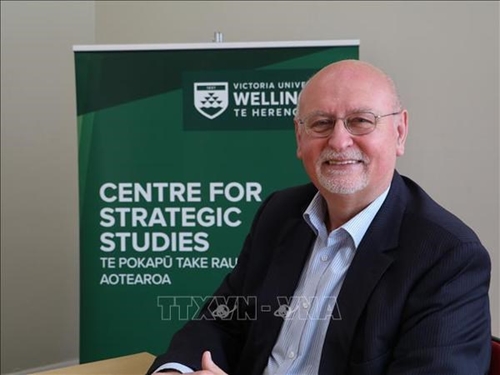December 03, 2022 | 22:04 (GMT+7)
Top Vietnamese legislator's New Zealand visit affirms strong partnership: Scholar
The New Zealand - Vietnam strategic partnership reflects the excellent state of the bilateral relationship between the two countries, said Emeritus Professor Roberto Rabel at the Center for Strategic Studies under the Victoria University of Wellington.
Prof. Rabel made the comment in an interview granted to the Vietnam News Agency’s correspondent ahead of National Assembly (N.A.) Chairman Vuong Dinh Hue’s official visit to New Zealand from December 3-7 at the invitation of Speaker of the House of Representatives Adrian Rurawhe.
    |
 |
|
Emeritus Professor Roberto Rabel at the Center for Strategic Studies under the Victoria University of Wellington |
According to the professor, there are already many areas in which New Zealand and Vietnam are cooperating actively such as trade, investment, capacity-building and education. There remains scope, however, to lift the scope and depth of cooperation in all those areas and others. A key way of doing this would be for the two sides to do more to identify and focus on the most "strategic" goals of their partnership and then to institutionalize mechanisms (and resources) for advancing those goals.
The development of the strategic partnership can also be enhanced by drawing more explicitly on the reservoir of good will that has been created by the growing people-to-people links that have developed over the past few decades, especially through the thousands of Vietnamese students and officials who have had educational and training experiences in New Zealand, he said.
Prof. Rabel said that following closely on New Zealand Prime Minister Ardern's successful trip to Vietnam, N.A. Chairman Vuong Dinh Hue's visit serves as an affirmation of the strong partnership between the two countries and the potential for even greater cooperation. It is especially significant that N.A. Chairman Vuong Dinh Hue leads the Vietnamese National Assembly, because his visit offers an opportunity to forge closer links between the two legislatures and to compare notes about how they work to ensure public accountability for the actions of government in both countries. The broadening of mutual understanding that flows from such visits is invaluable for the deepening of the bilateral relationship. It would be especially useful if the visit leads to more regular exchanges of views between the two legislatures and identifies possible ways in which New Zealand can assist Vietnam's development, through specific training programs in English for National Assembly members and their support staff (building on education and training programs provided for officials in the past). It would also be desirable for N.A. Chairman Vuong Dinh Hue's visit to be followed up by a visit to Vietnam by a New Zealand parliamentary delegation led by the Speaker of the House.
Prof. Rabel noted that New Zealand and Vietnam are already constructive contributors to regional peace and prosperity. In addition to their bilateral relationship, they can best enhance their contributions by working together in multilateral settings to strengthen regional economic, political and security architecture-such as through the CPTPP and the numerous ASEAN-led regional fora such as the East Asia Summit. Above all, both countries share a commitment to a rules-based regional order which allows for peaceful interaction between a diversity of states and enables all those diverse voices to be heard rather than just those of the most powerful states. Ensuring that a rules-based order prevails in the region requires upholding the importance of ASEAN "centrality" as a focal point for bringing together all states in the region in an inclusive way.
Through reciprocal visits such as those by Prime Minister Ardern and N.A. Chairman Vuong Dinh Hue, Vietnam and New Zealand can exchange views on how to cooperate more effectively both in bilateral and regional settings in ways which build on our mutual interests in maintaining regional peace and prosperity, while respecting each other's independent foreign policies, he stressed.
Source: VNA